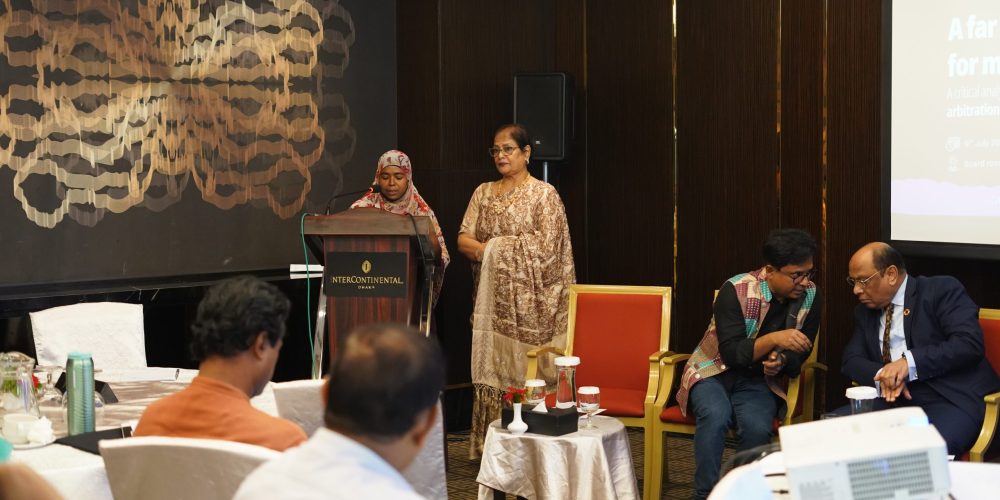Dhaka, 9 July 2025 — At a time when Bangladesh continues to celebrate its remittance-driven economy, Ovibashi Karmi Unnayan Program (OKUP) has called urgent attention to the glaring injustice faced by its very lifeline—the migrant workers.
In a packed hall at Hotel Intercontinental, OKUP organized a National Consultation to disseminate the findings of its new action research titled “A Far Cry from Justice for Migrants: A Critical Analysis of Migrants’ Experiences in the Arbitration System in Bangladesh.” The event brought together policymakers, human rights defenders, returnee migrants, legal experts, and development partners to push for reforms in the country’s arbitration mechanism.
Action Research Exposes Systemic Failures
In his keynote presentation, Mr. Shakirul Islam, Chairperson of OKUP and the lead researcher of the study, emphasized that “justice is not missing because of the absence of laws, but because of the absence of accountability and access.” Drawing from the lived experiences of 114 returnee migrant workers supported by OKUP, he revealed alarming trends:
- 75% of migrants never received job contracts before departure
- 97% used informal middlemen rather than legal recruiting agencies
- 61% of arbitration cases remain unresolved—many without even a hearing
- Female returnees face extreme vulnerabilities—47% reported sexual abuse abroad
“Violations begin at home, not abroad. The broken recruitment system is where the exploitation starts. Without fixing that, arbitration becomes a band-aid for a bleeding wound,” said Mr. Islam.
He urged structural reforms including a dedicated and independent arbitration tribunal, online case tracking systems, and legal aid centers abroad. He also demanded criminal prosecution of recruiting agencies that exploit workers with impunity. “The justice system must stop functioning like a favour and start acting like a right,” he emphasized.
A Call to Rethink the National Narrative
Mr. Omar Faruque Chowdhury, Executive Director of OKUP, delivered the opening remarks, emphasizing that symbolic gestures—like red carpets and welcome lounges—are not enough.
“If after 50 years of independence, we still cannot change even a single line of injustice, what are we really achieving?” he asked.
He criticized the government’s emphasis on numbers—how many were sent abroad—without reporting how many returned empty-handed or how many cases were resolved. “The focus must shift from sending to safeguarding.”
Returnee’s Voice Sets the Tone
The most powerful moment came from Ms. Rehena, a returnee migrant worker who survived severe abuse in Saudi Arabia. Locked in a bathroom for days without food, her voice broke as she said:
“We are told we’re the economy’s lifeline—but we are treated like we don’t matter. Not at home, not abroad. All we ask for is dignity and justice.”
Legal Experts Demand Institutional Change
Mr. Nafiz Imtiaz Hassan, Director at BNWLA, stressed that the issue is not lack of law, but the failure of enforcement. He proposed amending the Overseas Employment and Migrants Act 2013 to broaden its scope and ensure criminal accountability for recruiting agents and intermediaries.
“The same official cannot investigate, arbitrate, and deliver verdicts. That’s not justice—it’s administrative juggling,” he noted.
Dr. Qazi Zahed Iqbal, Advocate, Supreme Court of Bangladesh, called for an independent, gender-sensitive arbitration mechanism.
“Compensation is arbitrary. We need standard frameworks. We need institutional credibility, not compromises.”
Rights Advocates Demand a People-Centered Migration System
Mr. Shariful Islam Hasan, Associate Director, BRAC, denounced the state’s failure to support migrants in crisis. “Recruitment is now a money-making business run by syndicates. The same system that praises migrants abandons them when they need justice.”
Mr. Asif Munier, Migration Specialist, emphasized that justice should not be defined only in legal or economic terms, but in dignity and recognition. He added, “Migrant workers must be seen as rights-holders, not burdens or statistics.”
Mr. Abul Bashar, Project Director at Helvetas, cautioned against over-reliance on compensation:
“Justice is not just repayment—it’s prevention, accountability, and power balance.”
Government Acknowledges Gaps but Urges Collective Action
Representing the government, Dr. Neyamot Ullah Bhuiyan, Senior Secretary of the Ministry of Expatriates’ Welfare and Overseas Employment, acknowledged the importance of the research and pledged greater coordination with civil society to improve justice mechanisms.
Mr. Mohammad Abdul Hai, Additional Director General of BMET, shared ongoing efforts such as the “Ami Probashi” digital platform and pre-departure orientation but admitted, “The government alone cannot ensure justice. We need collective effort.”
Toward a New Era of Justice for Migrants
The consultation ended with a united call for reform—from both civil society and government officials. As Mr. Shakirul Islam concluded:
“Justice for migrants should not be delayed, diluted, or decorative. It must be structural, institutional, and survivor-centered.”
With over 13 million Bangladeshis working abroad, this research and the national consultation mark a critical step in reimagining justice—not just as a legal formality, but as a fundamental human right.


